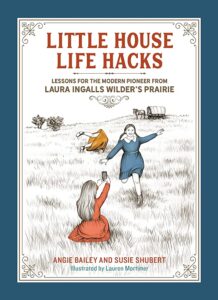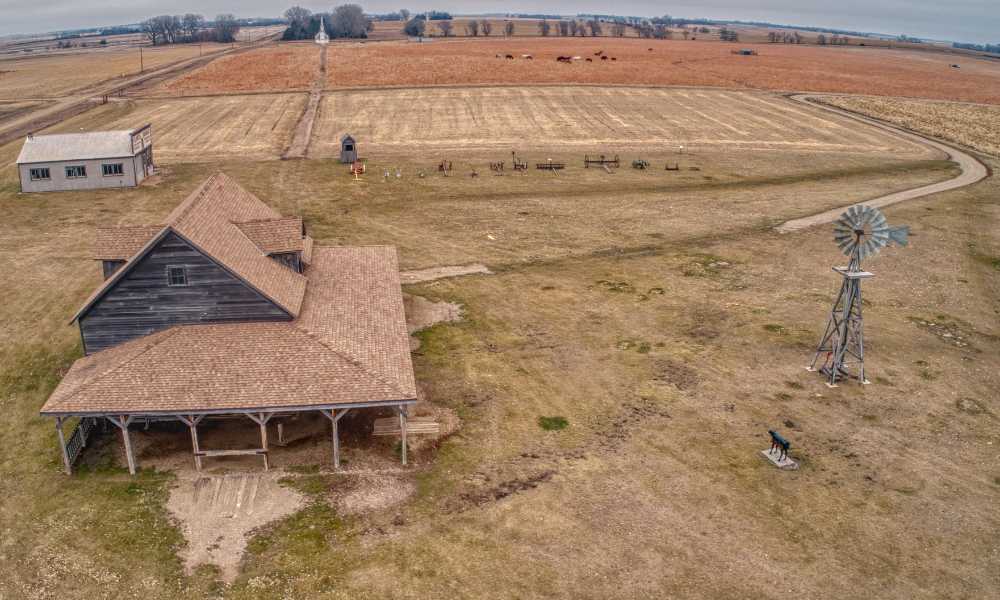This post was last updated on March 6th, 2024 at 06:58 pm
If you’re a Gen Xer and grew up watching “Little House on the Prairie,” it’s almost impossible to watch the TV show today without being hit by a wave of nostalgia. The show, which aired from 1974 to 1983, was the equivalent of comfort food for TV. It was based on a book series about the Ingalls family and their perseverance in the face of hardships as pioneers during the late 1800s. They lacked money, and disease and natural disasters were a constant threat. Yet somehow they managed. They did better than manage, actually. They were a content, happy family.
In this age of rampant consumerism and constant digital distractions, many of us could benefit from the Ingalls’ example. You’ll discover many ways to think about the family in a new book, “Little House Life Hacks: Lessons for the Modern Pioneer from Laura Ingalls Wilder’s Prairie.” The authors, Angie Bailey and Susie Shubert, both come from the perspective of being Gen Xers who grew up watching the show and reading the books.
The two didn’t know each other as children but shared an interest in “Little House” while growing up.
“‘Little House’ was something we both loved in childhood,” Shubert told Frugalmatic. “In the book, we mentioned how Angie would wear her braids like Laura’s, and I had one of those little sleeping caps, and we used to pretend to play ‘Little House on the Prairie.’ It’s always been part of our lives in one way or another.”
Shubert and Bailey, who are both from the Minneapolis area, met when they were each bringing their kids to a dance class about 25 years ago. They stayed in touch over the years. When Bailey wanted to write a book about Gen X pop culture, she reached out to Shubert, who’s a certified life coach. That’s when they decided to write about “Little House.”

“What’s so interesting is that we talk about how so many things from the ‘Little House’ apply to now. And the values are very similar. Families still want to have open communication, and they want to have quality time together,” Bailey said. “There were so many things that happened back in the day that we can bring in and modernize.”
The book is filled with both nuggets of wisdom and practical, DIY ideas. It turns to the characters of “Little House” to illustrate ways to approach life’s problems. Bailey and Shubert understand how “Little House,” which draws from Laura Ingalls Wilder’s own experiences growing up, revolves around the Ingalls family’s commitment to doing what is right. No matter how big or small their problems, the Ingalls carry themselves with a calmness and certitude that leaves us as readers and viewers wanting some of that magic in our own lives.
In their book, Shubert and Bailey seek to tap into that magic. Along the way, they offer interesting snippets of what life was like during the pioneer days. I didn’t know, for instance, that many pioneers cleaned their teeth with a “little ‘brush’ made by fraying the end of a birch twig.” They used “burnt eggshell ashes and animal hooves” for toothpaste.
I’ll take my electric toothbrush over a birch twig any day, but that’s not the point. This isn’t a book about comparing today’s technology to yesterday’s. It’s more about recognizing that the “stuff” in our life doesn’t sustain us. Our values sustain us, and we shouldn’t allow our gadgets, our money, or anything else to get in the way of what truly matters. This book leaves you thinking that, the next time you encounter a problem, you might want to ask, “What would the Ingalls do?”
Read more excerpts from my interview with Angie Bailey and Susie Shubert below. Some responses have been edited for length and clarity.
Frugalmatic: If you could bottle up one thing from that time period, the late 1800s, and bring it back to today, what would it be?
Susie Shubert: There was something about the blissful ignorance that people of that time period had. Of course, we’re so thankful for technology and all the things we can do with it now and being connected all over the world. But sometimes I feel like a big reason why a lot of us are so stressed all the time is because we’re inundated with news and things from all over the world that are just heartbreaking. And it’s just coming at us all the time. Back in that time, the Ingalls family would have no idea what was happening in the big world outside their little town, except through an occasional newspaper. Even though it is wonderful to be able to know, not having that in your face all the time would be kind of nice.
Angie Bailey: One thing we write about in our book is that we challenge people to turn off their notifications or stop following Facebook pages that are always reporting negative news and things are just dragging you down. Start following pages that have good news or things that create more joy in your heart. Or, things that provide ideas that you could find useful. We have so much control over that. We don’t have to have negative news all the time. We have a choice. And it’s about what kind of choice we want to make.


Frugalmatic: What can we learn from how the Ingalls family balanced pressures on them to modernize and their interest in preserving their values and way of life?
Angie Bailey: One thing that was great about the Ingalls—Charles and Caroline were great examples of this—is that everything they did came from a place of their values. They would have a choice and ask, ‘Does this match our values?’ If it did, then it was a good choice. If it didn’t, then something would happen where they would wish they made a different choice. I remember specifically an episode of the TV show where Pa and Mary took a train to Chicago. It was a farmer’s convention. And all the way they found themselves being gifted upgrades to the train car and to the food. When they arrived, they had a beautiful hotel room. But then it turns out the only reason they were given them is because they wanted to buy his boat. That was against his values, and they immediately checked out of the hotel. They were like, ‘This is not worth it.’ Their family, in general, was a really good example of making sure that what they did went back to their values.
Susie Shubert: A lot of it has to do with their faith. Faith is so broad now, in our world. It encompasses so many different ways to believe, both spiritually and having faith in yourself and each other. You know that phrase, “Let go and let God a little more.”? The Ingalls had faith that as long as they had trust and stuck by their values, things would find a way to work out. Charles was incredible at that. The crop would die, and he’d walk 100 miles and be like, ‘I know I’ll find work because that’s what needs to happen.’
For them, they believed that was God helping them. Whether people believe that or not, there is something about being able to let go and take things as they come and know that you’ll be able to have the resilience, and you’ll be able to figure it out when hardships come.
Read: What ‘Frugal Housewife’ can teach us 200 years later
Frugalmatic: Television is nothing like it used to be when “Little House on the Prairie” aired, with the whole family sitting down each week to watch their favorite show. How can we be better at watching TV (if that’s possible) in this new era of streaming?
Susie Shubert: I’ll be the first to admit I love TV. I love Netflix. I love all of that stuff. That’s the way I unwind at the end of the day, my husband and I. We really enjoy that. Sometimes it’s frustrating because I feel the messages are, ‘It’s all or nothing.’ You know? If you watch too much TV, it’s going to be bad for your brain. Well, that’s true. If all you ever did was sit and watch TV all day long, of course that wouldn’t be beneficial. But I also think there’s a good side to TV.
But as far as getting better at it, to me, it’s about being really mindful of what you’re watching, especially with kids. I remember when our kids were young, we were more strict than a lot of people as far as what we let our kids watch. And I’m not judging other people that let their kids watch certain things. It’s just we would really think hard about what our kids were watching. Do we want our kids to talk like how this character is talking? And I think balancing that with conversation is a huge thing. It just all comes down to balance and it comes down to knowing values, knowing what’s important to you.
Angie Bailey: To me it feels like communication is one of the biggest pieces. When you watch things together, you can always nowadays pause and say, ‘Let’s talk about what just happened. Do you have any questions?’ Or the next night, talk about it over dinner. I think TV can be really valuable as a conversation starter with your family. My kids had friends whose parents would let them watch anything. That wasn’t the case at our house. But everybody’s different. In your home, you can set limits. Or you can create conversations around topics that you feel maybe need more explanation. Maybe there’s a topic you want to ask them about and say, ‘What are your thoughts on this?’ It really gets them to look at things more mindfully and more carefully, which helps them in life. I mean, who doesn’t need to be a better communicator?

